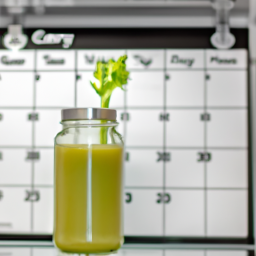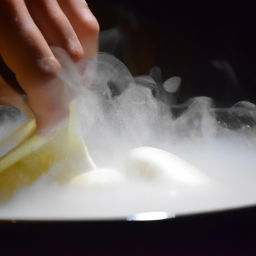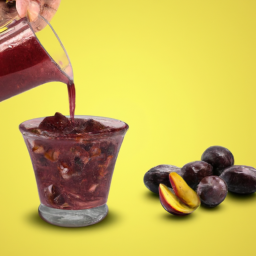As someone who values a healthy lifestyle, I have been enjoying the benefits of consuming celery juice for some time now. Unfortunately, my busy schedule makes it difficult to prepare fresh celery juice every day. That’s why I often make larger batches and store them in the refrigerator for later consumption.
However, I’ve always wondered, how long can celery juice last in the fridge? In this article, I will be exploring the factors that affect the shelf life of celery juice and how long it can last in the fridge. I will also provide tips for properly storing celery juice, freezing it, and using it.
Additionally, I will discuss the benefits of drinking celery juice and any potential risks or precautions to keep in mind. Whether you’re a fan of celery juice or just starting to explore its benefits, this article will provide you with all the information you need to know about keeping your celery juice fresh and delicious.
Key Takeaways
- Proper storage of celery juice in the fridge can ensure it stays fresh for up to a week.
- Celery juice should be consumed within 24-48 hours of juicing to maximize nutritional value.
- Storing celery juice in an airtight container and in the coldest section of the fridge can help it last longer.
- The longer celery juice is stored, the more nutrients and enzymes it will lose, so it’s best to consume it as soon as possible.
Factors that Affect the Shelf Life of Celery Juice
If you’re wondering how long your beloved celery juice will last in the fridge, it all depends on a few key factors. One of the factors that affects the shelf life of celery juice is the juice preservation techniques used.
Celery juice can be preserved using pasteurization or high-pressure processing to extend its shelf life, but these methods may result in a loss of some nutrients in the juice. It’s essential to note that fresh celery juice is the best option if you want to enjoy all the nutrients it has to offer.
Another factor that affects the shelf life of celery juice is the effect of temperature. When celery juice is exposed to temperatures above 40°F, it may start to spoil quickly. Therefore, it’s important to store celery juice in the fridge and make sure the temperature is below 40°F to extend its shelf life.
Additionally, you can freeze celery juice to preserve it for a more extended period. Now that we know the factors that affect the shelf life of celery juice, let’s dive into how long celery juice can last in the fridge.
How Long Can Celery Juice Last in the Fridge?
When stored properly, your refreshing glass of celery goodness can stay fresh and crisp for up to a week in your refrigerator. This is great news for those who want to enjoy the benefits of celery juice throughout the week without having to make a fresh batch every day.
Celery juice is packed with essential vitamins and nutrients that provide numerous health benefits, such as reducing inflammation and aiding in digestion. To make sure your celery juice stays fresh, it’s important to use proper juicing techniques and store it correctly.
For example, using a cold press juicer can help preserve the nutrients in the celery juice compared to using a high-speed blender. Additionally, make sure to store your celery juice in an airtight container and keep it towards the back of the fridge, where the temperature is coldest.
With these tips in mind, you can ensure that your celery juice stays fresh and delicious for as long as possible. Next, let’s dive into some tips for properly storing celery juice to maximize its shelf life.
Tips for Properly Storing Celery Juice
When storing celery juice, I always make sure to use air-tight containers to keep it fresh for a longer period.
I also keep it away from light to prevent oxidation and loss of nutrients.
It’s important to store the juice in the coldest part of the fridge to maintain its freshness.
Using Air-Tight Containers
To keep your celery juice fresh, store it in an air-tight container in the fridge. This will help preserve its nutrients and flavor for a longer period of time.
Here are some types of air-tight containers and the benefits of juicing that you should consider when storing your celery juice:
-
Glass Jars – They’re eco-friendly, reusable, and won’t leak any harmful chemicals into your juice. Plus, glass jars are easy to clean and you can see through them to monitor the condition of your juice.
-
Plastic Bottles – They’re lightweight, shatterproof, and can be easily transported. However, make sure that the plastic bottles are BPA-free to avoid any harmful chemicals from contaminating your juice.
-
Vacuum-Sealed Bags – They’re convenient, space-saving, and have a longer shelf life. But, the downside of using this type of container is that it may be difficult to measure the amount of juice you want to consume.
By using air-tight containers, you can prolong the freshness of your celery juice. However, keeping the juice away from light is also important to maintain its quality.
Keeping the Juice Away from Light
Shield your succulent sip from sunlight by storing it in a shady spot. Light exposure affects the shelf life of celery juice and can cause it to spoil faster than it would in ideal conditions. This is because light can trigger a reaction in the chlorophyll in the celery, leading to the breakdown of the juice’s nutrients and flavor.
To avoid this, it’s important to store celery juice in a dark, cool place, such as a refrigerator. Fortunately, there are shelf life extension techniques that can help keep celery juice fresh for longer periods of time. One of these techniques is to use a dark, opaque container to store the juice, which can help block out light and prevent it from having a negative impact on the juice’s nutrients.
Additionally, storing celery juice in the coldest part of the fridge can help slow down the natural breakdown of the juice, allowing it to stay fresh for longer. With these tips in mind, you can enjoy the benefits of celery juice for days to come.
Storing in the Coldest Part of the Fridge
By placing it in the coldest section of your refrigerator, you can ensure that your celery juice remains fresh and nutritious for an extended period. Temperature control is crucial for preserving the nutrients and enzymes present in the celery juice. Improper storage can cause the juice to spoil quickly, losing its nutritional value.
Proper placement of the celery juice in the refrigerator is important. Here are some tips to ensure that your celery juice stays fresh for as long as possible:
- Store the celery juice in the coldest section of the fridge, which is usually the back of the bottom shelf.
- Keep the celery juice away from the door, as the temperature fluctuates there more frequently.
- Use airtight containers to prevent air from getting into the juice, which can cause spoilage.
Now that you know how to properly store your celery juice, let’s move on to the next step – freezing celery juice.
Freezing Celery Juice
If you don’t plan on drinking all of your celery juice within a few days, you can extend its lifespan by freezing it. Freezing celery juice is a great option if you want to have a supply of celery juice on hand without worrying about it going bad. However, there are some things to keep in mind when freezing celery juice to ensure that it maintains its quality.
One important factor to consider when freezing celery juice is the blending technique you use. If you use a blender that creates a lot of heat, it can cause the juice to lose some of its nutritional value and flavor. It’s best to use a lower speed blender or a cold press juicer to create your celery juice. Additionally, you should also consider flavor combinations when freezing celery juice. Some ingredients, like citrus fruits, may not freeze well and can cause the juice to separate or become bitter. To help you decide which flavors to freeze, here’s a table of compatible ingredients for celery juice:
| Compatible | Neutral | Incompatible | |
|---|---|---|---|
| Cucumber | Spinach | Apple | |
| Lemon | Kale | Orange | |
| Lime | Carrot | Pineapple | |
| Ginger (small) | Beet (small) | Grapefruit (small) |
With these tips in mind, you can freeze your celery juice and have it ready when you need it. But how do you thaw it out without losing its nutrients? Let’s move on to the next section to find out.
Thawing Frozen Celery Juice
To make sure you get the most out of your frozen celery juice, there’s a simple trick to thaw it out properly. There are a few different thawing methods you can try, but the best way is to transfer the frozen juice from the freezer to the fridge and let it thaw slowly overnight. This will prevent any flavor changes and ensure that the juice retains its nutrients.
Here are three tips for thawing frozen celery juice properly:
- Avoid thawing the juice at room temperature, as this can cause bacterial growth and spoilage.
- Don’t microwave the juice to thaw it, as this can destroy some of the nutrients and alter the flavor.
- Once the juice is thawed, give it a good shake or stir before consuming to ensure that any separation is mixed back in.
Using frozen celery juice can be a convenient way to enjoy the health benefits of this nutritious drink all year round.
Using Frozen Celery Juice
When it comes to incorporating frozen celery juice into recipes, there are a few key things to keep in mind. First and foremost, it’s important to thaw the juice properly before using it in any recipe.
Additionally, you may need to adjust the amount of liquid in your recipe to account for the added moisture from the frozen celery juice.
As for best practices for using frozen juice, always label and date your containers to ensure freshness and use within a reasonable timeframe.
How to Incorporate Frozen Juice into Recipes
You can easily add some frozen celery juice to your smoothies or sauces, just like throwing in a handful of frozen berries.
Frozen celery juice can be a great addition to creative recipes, not only for its nutritional benefits but also for its unique flavor profile. It can add a refreshing and slightly bitter taste to your dishes, making them more interesting and enjoyable.
When incorporating frozen celery juice into your recipes, it’s important to consider the texture and consistency of the dish. Frozen juice may add more liquid to your recipe, so you may need to adjust other ingredients to achieve the desired texture.
Additionally, it’s best to thaw the frozen juice before using it, as it can be difficult to blend or mix the frozen chunks into the dish. Overall, frozen celery juice can be a great ingredient to add to your culinary repertoire, just be mindful of the texture and consistency when using it.
Best Practices for Using Frozen Juice
If you’re looking for an easy way to add some extra nutrition and flavor to your recipes, consider incorporating frozen juice. Not only is it convenient, but it also has numerous nutritional benefits.
You can use frozen juice in a variety of creative recipes, from smoothies and cocktails to marinades and dressings. One of the main benefits of using frozen juice is that it retains most of its nutritional value.
Unlike bottled juice, which is often pasteurized and contains added sugars and preservatives, frozen juice is usually made from fresh fruit and vegetables. This means that it contains more vitamins, minerals, and antioxidants. Plus, frozen juice can be stored for longer periods of time, making it a great option for busy schedules.
However, it’s important to keep in mind that frozen juice may alter the texture and flavor of some recipes, so it’s best to experiment and find the right balance for your taste buds.
Now, let’s dive into some tips for making celery juice last longer.
Tips for Making Celery Juice Last Longer
To keep your celery juice fresher for longer, try storing it in an airtight container in the fridge with a few ice cubes to keep it chilled and refreshing. This will help to slow down the oxidation process and keep the nutrients and enzymes intact. Another tip is to add a squeeze of lemon juice to your celery juice before storing it in the fridge. The acidity of the lemon juice helps to preserve the juice and keep it fresh for longer.
Here’s a table to help you understand how long celery juice can last in the fridge:
| Storage Method | Refrigerator | Freezer |
|---|---|---|
| In an airtight container | 3-5 days | 3-4 months |
| In a plastic bag | 1-2 days | 6-8 months |
| In a glass jar | 3-5 days | Not recommended |
As you can see from the table, storing your celery juice in an airtight container can help it last for up to 5 days in the fridge. However, it’s important to note that the longer you store your celery juice, the more nutrients and enzymes it will lose. With that said, it’s best to drink your celery juice as soon as possible to reap the benefits of its health properties. Speaking of which, let’s move on to the next section and talk about the benefits of drinking celery juice.
Benefits of Drinking Celery Juice
Sipping on a refreshing glass of chilled green elixir can provide a burst of energy and promote overall well-being. Celery juice has gained popularity in recent years due to its numerous health benefits. Here are some of the reasons why you should consider incorporating celery juice into your daily juicing routine:
- High in antioxidants, which can help protect your cells from damage caused by free radicals
- Contains phytonutrients that may help reduce inflammation in the body
- Rich in vitamins and minerals, including vitamin K, potassium, and folate
- May aid in digestion and improve gut health due to its high fiber content
When it comes to juicing techniques, celery can be a bit tricky as it tends to be stringy and fibrous. To maximize its nutritional value, it’s recommended to juice the entire celery stalk, including the leaves and stems. Be sure to wash the celery thoroughly before juicing and consume the juice immediately or store it in an airtight container in the refrigerator for up to 24 hours.
Moving on to the risks and precautions, it’s important to note that celery juice may interact with certain medications, such as blood thinners, and may not be suitable for individuals with kidney problems. As with any dietary change, it’s always best to consult with a healthcare professional before adding celery juice to your daily routine.
Risks and Precautions
Before you jump into drinking celery juice regularly, it’s important to be aware of the risks and precautions associated with it. While celery juice is known for its numerous health benefits, it can also pose potential risks if not prepared and consumed properly. One of the main concerns is the potential for bacterial growth in the juice, which can lead to food poisoning and other health problems.
To minimize the risk of bacterial growth, it’s important to follow proper juicing techniques and storage guidelines. When preparing celery juice, make sure to wash the celery thoroughly and remove any dirt or debris. Use a clean and sanitized juicer and avoid leaving the juice sitting out at room temperature for too long. It’s recommended to consume celery juice within 24-48 hours of juicing and to store it in an airtight container in the refrigerator. To give you a better idea of how long celery juice lasts in the fridge, here’s a helpful table:
| Storage Method | Refrigerator Temperature | Shelf Life |
|---|---|---|
| Airtight Container | 38°F (3°C) | 24-48 Hours |
| Freezer | 0°F (-18°C) | 2-3 Months |
By following these simple precautions and storage guidelines, you can safely enjoy the many health benefits of celery juice without worrying about potential risks. Remember to always use fresh and clean ingredients and to consume the juice within a reasonable time frame to ensure its freshness and quality.
Frequently Asked Questions
Can I drink celery juice that has been left out at room temperature for a few hours?
Drinking warm celery juice is not recommended as it can quickly spoil and lose its nutritional value. Leaving it out at room temperature for a few hours increases the risk of bacterial growth and contamination.
What is the best way to store celery juice if I don’t have a fridge?
If I don’t have a fridge, I can store celery juice by keeping it in a cool and dark place. Alternatively, I can freeze it in an airtight container and thaw it when needed.
How often should I drink celery juice to maximize its health benefits?
To maximize the benefits of celery juice, I drink it daily on an empty stomach. Research shows it may improve digestion, lower inflammation, and boost immunity. There are many ways to incorporate it into your diet, such as blending with other fruits and vegetables.
Can I mix other fruits or vegetables with my celery juice to make it last longer?
Oh sure, let’s mix in some other fruits and veggies to make celery juice last longer. Because that’s a thing. Alternative preservation techniques include freezing or using a vacuum sealer.
What are some common signs that celery juice has gone bad and should not be consumed?
As for signs of spoiled celery juice, look for mold or an off smell. The shelf life of celery juice is around 24-48 hours in the fridge, so it’s best to consume it fresh.
Conclusion
As I take the last sip of my freshly made celery juice, I can’t help but feel a sense of contentment knowing that I’ve maximized its shelf life.
Proper storage is crucial in maintaining the quality and nutritional value of this drink. Symbolically, it’s like taking care of ourselves by making sure we’re consuming the best version of ourselves.
Drinking celery juice has numerous benefits for our health, and it’s important to make sure we’re getting the most out of it. By following the tips on how to store and make it last longer, we can enjoy its benefits for a more extended period.
Let’s make sure we take care of ourselves, just like how we take care of our celery juice.









